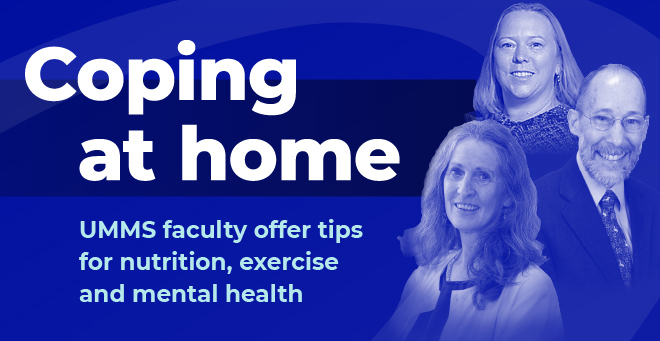
|
Conflicting messages about proper distancing and protective equipment while millions of people are staying home to thwart the novel coronavirus are leaving some wondering what’s safe. What’s more, wellness habits can be hard to maintain when you’re stuck indoors.
UMass Medical School faculty have advice on research-based, healthy ways to cope with staying home.
Barbara Olendzki, RD, MPH, associate professor of quantitative & population health sciences and director of the Center for Applied Nutrition, said the patients she works with through telehealth are coping in different ways.
“Fifty percent of folks are doing so well and cooking and exercising more,” she said. “The other 50 percent are really struggling with comfort foods and convenience foods and doing a lot more sitting.”
Olendzki researches and works with patients with inflammatory bowel disease (IBD), diabetes, cardiac concerns, cancer and other inflammatory diseases.
Emotional stress is a common factor in triggering inflammation and Olendzki said she is concerned about people having flare-ups of chronic conditions. She developed an anti-inflammatory diet based on research on boosting beneficial bacteria in the gut, which she said can mitigate symptoms and help fight viruses. The diet can be helpful to anyone.
“By feeding the gut microbiome, we increase or enhance our immune system,” Olendzki said.
Some of the healthiest grocery-shopping choices during this pandemic are vegetables such as sweet potatoes, asparagus, brussel sprouts, onions and carrots, and cans of any kind of beans, she said. These can be roasted together in the oven, with olive oil, rosemary or turmeric, for a protein-rich, high fiber meal that supports good bacteria.
Grab veggies and hummus, or cottage cheese or yogurt with active live cultures, and a few cherry tomatoes for more gut-biome-friendly snacking, she suggested.
“Writing down or tracking via an app can be helpful, so you’re not mindlessly eating all day long,” she said.
If you succumb to some tempting comfort food, Olendzki said grant yourself forgiveness, but don’t give up.
James B. Broadhurst, MD, assistant professor of family medicine & community health, said getting outdoors, if it can be done with appropriate physical distancing, is a healthy activity.
“As a sports person, I’m going to say I’m eager for people to go out and exercise, and I think if they wear a mask, that is terrific,” said Dr. Broadhurst.
He said there haven’t been any peer-reviewed published studies of coronavirus transmission involving human exercisers in real conditions outdoors.
Still, he said, wearing a mask reduces the risk of infecting others, which is particularly important if exercising around others. Runners, walkers and cyclists should go widely around people they pass and avoid being in the slipstream, directly behind another person, where concentrations of exhaled respiratory particles travel.
“If you look at exercise and social isolation, and physical and mental health, the benefits in my opinion of people going out and exercising every day far outweigh any risk associated with this,” Broadhurst said. The risks “depend a bit on the environment you are in,” he said.
Getting outside and exercising can be mood lifters during home isolation, but sometimes people need more to address mental health concerns.
Amy L. Harrington, MD, assistant professor of psychiatry, said outpatient mental health services have moved to telehealth because of COVID-19, but that has opened more access to treatment.
“If people are in need of services, this is a great time to reach out because there is a lot of availability,” she said. Primary care providers can refer patients to the outpatient clinic.
Dr. Harrington said if people are finding they’re not able to function in their job or take care of their children because they’re depressed, or if they’ve had thoughts of harming themselves, they should reach out for treatment [The National Suicide Prevention Lifeline is 1-800-273-8255].
Some people are starting healthier habits now, Harrington said, including those who have become motivated to quit smoking because having healthy lungs helps protect from further harm by the coronavirus. Smoking cessation counseling and programs work well through telehealth, she said.
But heavy substance use is a risk for those staying home.
There are plenty of social media memes being shared about drinking to cope with the stress of isolation while homeschooling children and working remotely. They might be funny, Harrington said, but, “If people are noticing that their alcohol use is going up, or their substance use in general is going up, that’s something maladaptive that could turn into a problem.”
Twelve-step recovery meetings are widely available online, according to Harrington, with more than 120 virtual meetings taking place each week in Central Massachusetts.
She said, “If people are concerned, this is a great time to check out a meeting because you literally don’t even have to walk in. You can just get on your telephone and observe.”
Harrington said, “I’m a big proponent of the whole term ‘physical distancing’ and getting away from this term of social distancing, because social distancing can be very dangerous.”
Getting creative with reaching out to family and friends and connecting with them, whether through video chats or phone calls, can help, she said.